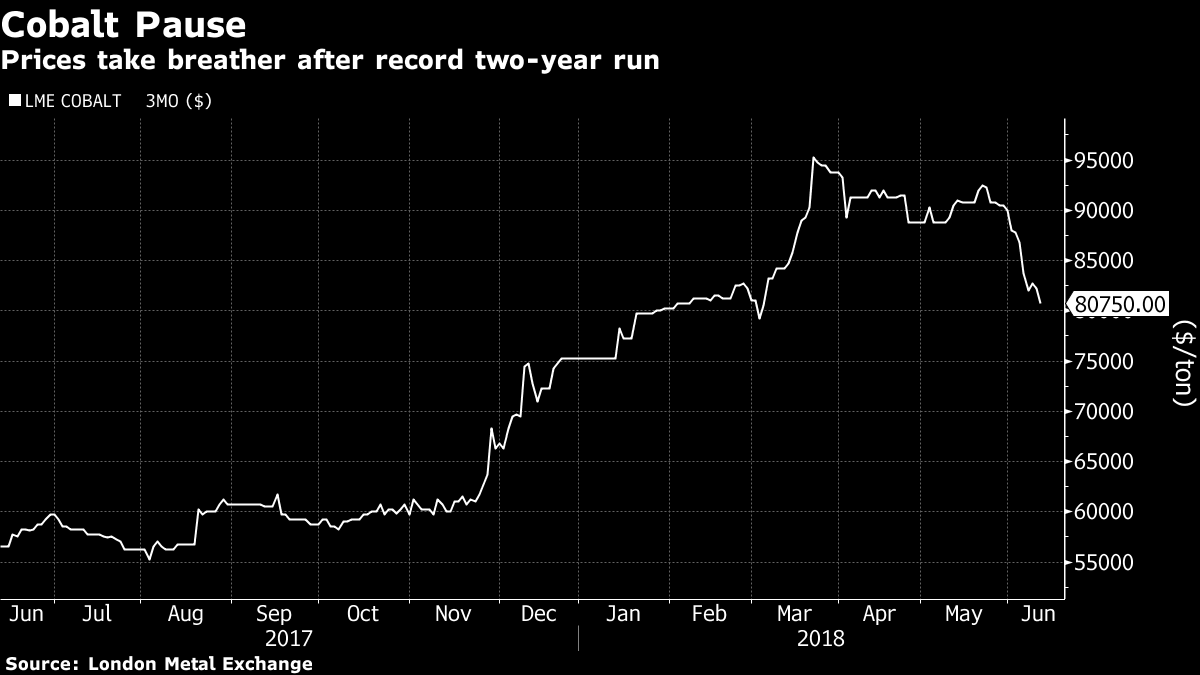The search for cobalt, a key component of the battery-powered auto fleets of the future, has arrived on
BMW AG’s doorstep with a discovery of an ore deposit not far from the plant where the German manufacturer
makes its i3 electric city car.
The cobalt find in a forested section of Saxony’s Eichigt municipality, Germany’s first detection of the metal in modern times, could revive mining in an area that last saw activity during the Renaissance, and help diversify raw-materials supply, exploration company
Lithium Australia NL said. Some 60 percent of the world’s cobalt is concentrated in the Democratic Republic of Congo, where concerns over working practices and political strife have sparked a global hunt for alternatives sources.
Lithium Australia plans to “become a major supplier of energy metals — lithium and cobalt in particular — into the European market,” Managing Director Adrian Griffin said Wednesday in an emailed response to questions. The region “is the fastest-growing geographic sector for lithium-ion cell consumption outside China.”

Production of battery cells, which are assembled into the packs that power electric cars, has so far been concentrated in Asia. That’s set to change as European carmakers like
Volkswagen AG and Mercedes-Benz parent
Daimler AG ramp up offerings of electric vehicles. China’s
BYD Co. is contemplating a factory in Europe, while Stockholm-based Northvolt AB
is set to develop a 4 billion-euro ($4.7 billion) plant in Sweden to rival Tesla Inc.’s Gigafactory. Contemporary Amperex Technology Co., the manufacturer known as CATL that’s China’s biggest cellmaker, is
nearing a decision to set up a facility in Germany.
To be sure, the journey from discovery to producing minerals takes years and often fails. Other prospectors have jumped on the cobalt bandwagon following a record price spike, to tout promising early stage
projects in Canada and the U.S. Any hopefuls face competition from established Congo mines owned by major producers such as Glencore Plc.
To read more about cobalt’s bumpy ride, click here
Eichigt is located on the Czech border about 130 kilometers (80 miles) south of Leipzig, the largest city in Saxony and the site of BMW’s i3 plant. Lithium Australia this week bought the
Sadisdorf lithium project, also in the eastern German state, from Tin International AG, underscoring its ambition to develop a European supply chain. Meanwhile, competitor Saxony Minerals & Exploration AG has gained a license to prospect for minerals there, including cobalt.
“The processing available for the extraction of copper during the Renaissance, when mining started in the area, could not cope with cobalt,” a byproduct, said Griffin. “Indeed it is thought that cobalt — from the German root Kobold, the goblin — was so named because of the metallurgical difficulties it generated. Not so today. ”
— With assistance by David Stringer
